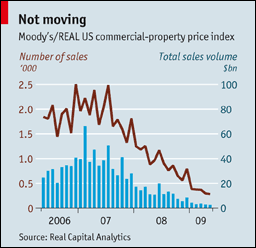One of the important unknowns that investors must grapple with currently is when the recovery will become self-sustaining allowing the government to reduce fiscal and monetary stimuli. Japan has tried several times since their asset bubble burst in the early 1990s to reduce the government’s support. Each time the economy stumbled badly resulting in 20 years of economic stagnation. Read more
Author: admin
11/18/09 – We hope he means what he says
Below are quotes from Fox News Channel’s interview with US President Barack Obama.
ON THE ECONOMY:
“There may be some tax provisions that can encourage businesses to hire sooner rather than sitting on the sidelines. So we’re taking a look at those.” Read more
8/25/09 – Real Estate still in crisis mode

Real Estate remains the biggest risk to the budding worldwide recovery and strong stock markets. A recent report from the Mortgage Bankers Association was filled with red flags: Read more
8/06/2009 – Financial Crises are Protracted Affairs
“Broadly speaking, financial crises are protracted affairs. More often than not, the aftermath of severe financial crises share three characteristics. First, asset market collapses are deep and prolonged. Real housing price declines average 35 percent stretched out over six years, while equity price collapses average 55 percent over a downturn of about three and a half years. Second, the aftermath Read more
7/28/2009 – From Investment Postcards from Cape Town (http://www.investmentpostcards.com)
Bespoke: Goldman Sachs raises year-end price target – should we care?
“Goldman Sachs’ David Kostin raised his year-end S&P 500 price target from 940 to 1,060 this morning [Monday]. While this means Kostin has become more bullish since issuing his prior target, it’s important to remember that he started 2009 with a year-end price target of 1,100 (which would have been a 2009 gain of 18.6%). A couple of weeks before the March 9 index bottom, Kostin Read more
7/22/2009 – Commentary on 2Q2009 Earnings Season
As of this commentary 75% of companies reporting earnings have beaten expectations providing a lift to the stock market and encouragement to investors. However, does this statistic suggest blue skies ahead or just a good job of corporate America managing earnings expectations? Read more
5/28/2009 – Is the U.S. Consumer Overleveraged or Flush with Cash?
Many bullish pundits argue there is a ton of cash to drive the stock market higher, while bearish pundits claim the U.S. consumer is up to their eyeballs in debt. Each camp has good evidence to back up their claims. The value of money-market funds exceeded stock funds earlier this month for the first time in 16 years. By comparison, the value of stock-fund holdings was more than three times Read more
2/25/2009 – Economics Not Politics
Everyone has an opinion about the government’s response to the economic crisis so we thought we might as well have our say as well. First of all, virtually no one is blameless. Democrats irresponsibly supported and defended Fannie Mae and Freddie Mac. Republicans irresponsibly allowed our financial institutions to leverage to the hilt and spent like drunken sailors during the Bush Read more
9/30/2008 – The Market Sell-Off
The stock market experienced a truly horrible day yesterday falling almost 9%. This action was in response to the House of Representative’s shocking failure to pass the $700 billion plan to bolster the financial system. There is serious stress in the credit markets and in our banking system making government support critical at this time.
The natural reaction for many investors is to end the pain of losses and sell stocks. While we can give no guarantees on what will happen in the short term, selling into panic markets usually ends up being the wrong move.
Historically, when fear and panic are rampant like today, stocks should be bought, or at least held onto, not sold. A common gauge of investor fear, the VIX index, is near an all-time high. Even money market funds are too risky as investors pull their money to buy T-Bills that pay virtually nothing. The cardinal rule of investing is to buy low and sell high. Please remember that the average stock has fallen by 29%. Stocks are low and should be bought for investors who can withstand the volatility and don’t need their money in the next few years.
Stepping back from the current nuttiness of the market should bring comfort in this time of uncertainty. We are very confident that the group of stocks we own in your portfolio is worth more than the current market prices. Our stocks have strong balance sheets, good long-term growth prospects, and low valuations. Unfortunately this doesn’t mean that prices can’t go lower in the short term. However, eventually markets calm down and stock prices gravitate to more reasonable valuation levels.
We are pleased that we’ve avoided all the collapses in the financial arena. However, recently companies connected with the global growth theme have come under extreme selling pressure. While we do not deny that current economic conditions will keep growth from reaching its near-term potential, growth will continue at attractive rates making current valuations unreasonably low.
5/22/2008 – Don’t Blame Speculators for High Oil Prices
Senator Joe Lieberman blames speculators for a big part of the commodity-price increases. He cites as evidence that the value of investment funds that aim to track the price of oil and other raw materials has risen from $13 billion to $260 billion over the past five years. Senator Lieberman and his colleagues are so worried that they are contemplating measures to limit investors’ ability to trade.
Are investors really to blame for high energy prices? On the surface this is ludicrous. We would argue that there should probably be significantly more money in the oil trade. $260 billion dollars in a pittance in today’s world economy and roughly equates to the current market value of Microsoft. The real answer to explain high energy prices is less sexy: economics 101 – supply and demand.
